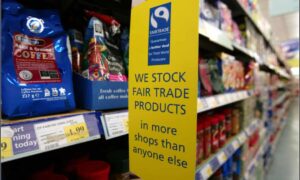
British consumers might have faced the sharpest increase in living costs for four decades, but despite the cost of living crisis, concerns over the environment and the treatment of farmers in poorer countries has fuelled a steady increase in ethical shopping.
As households across the country rein in their spending to deal with rising bills, Michael Gidney, the chief executive of the Fairtrade Foundation trade body, said consumers were still prioritising ethical products.
The group behind the Fairtrade mark – which is celebrating its 30th anniversary – expects to have earned more than £13m in income from the UK last year, slightly more than the £12.8m it earned in 2022. Businesses can apply for a licence to use the logo on approved products for a fee, so as sales increase, the fees to the foundation increase.
Gidney said: “2023 was a very challenging time for the UK economy, with supply chain shortages following the pandemic, very high inflation and a cost of living crisis affecting us all.”
“In this climate we are delighted that Fairtrade sales more than held their own, and while we are still finalising figures, we expect to see modest growth year on year. This is testament that, as happened in the financial crisis of 2008 to 2009, British shoppers do not trade down on their values when times are tough”.
Last year Fairtrade, whose label guarantees that the producers get a set minimum price and a financial bonus for community projects, urged shoppers to keep on buying the products it certified amid fears of a “race to the bottom” as struggling Britons look for ways to save money during the cost of living crisis.
Overall retail sales volumes in Great Britain have collapsed since inflation began to accelerate to the highest level since 1981, reaching a peak of 11.1% in October 2022 as household energy bills and the price of food and drink soared. While inflation has fallen back to 3.4%, it remains historically high. Lower inflation also does not mean prices are falling, only rising less quickly.
However, Gidney said the Covid pandemic and disruption to the production and transport of products around the world served to highlight how global supply chains could be reliant on the wellbeing of workers in remote places who produce the goods we rely on.
The climate crisis is also heightening concern about the future of farming of commodities including coffee and cocoa with the UN estimating half of the world’s land under coffee could be lost by 2050 because of the changing weather patterns.
In 2022, shoppers spent nearly 16% more on Fairtrade products. There was a big increase in sales of some newer commodities such as gold and rice, according to the Ethical Markets report by the Co-operative Bank and Ethical Consumer magazine.
“If you take the long view, I think we are winning the argument that trade can be sustainable and fair for people and planet,” said Gidney.
“The penny has dropped, that investment starts with primary producers,” he said.
